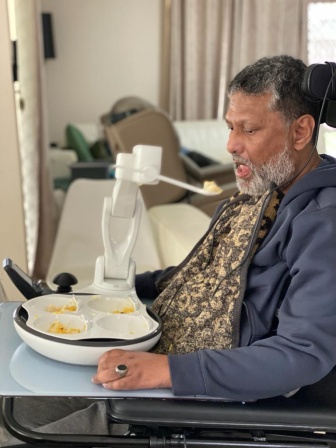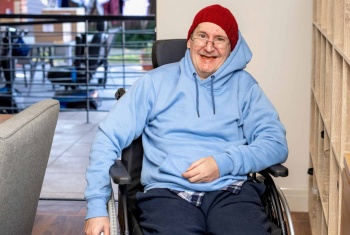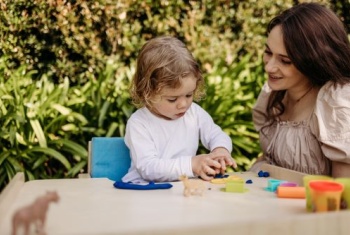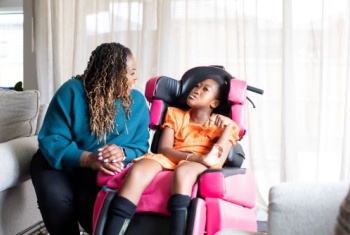Thanks to a range of assistive technologies funded through his NDIS plan, Kemal Omar is participating in everyday life again, and it means the world to him and his family.
The 58-year-old from Underwood, diagnosed with Motor Neurone Disease (MND) in 2018, now uses eye gaze technology.
It allows him to use his eyes to look at a screen to construct sentences and it reads them aloud.
He can also use it to write and reply to texts and emails.
Then there’s his head array control – a somewhat regular looking headrest which has sensors concealed inside.
It allows Kemal to tilt his head from side to side ever so slightly to manoeuvre his wheelchair.
He also has a robot to help him continue to eat independently.
Kemal’s wife Zubeida said all these technologies, plus a 24/7 support team, has been a blessing for Kemal and their family, who migrated to Australia in 1999 after Kemal was offered an IT role too good to refuse.
'We are lucky to live here in Australia.
'We wouldn’t get anything like the NDIS in South Africa.
'I think of it often.
'Maybe it’s the reason we immigrated.
'It was meant to be,' Zubeida said.
'If you have a disability in South Africa and you can’t afford to pay for supports you just wither away at home or in bed.
'But here in Australia, Kemal can do so much.
'The NDIS is just brilliant.
'We can’t thank the Scheme enough.
'The fact it allows people with disabilities to have so much independence and freedom.
'It really helps with your mental state.'
Zubeida said Kemal has always been “an active, hard-working, and hard-thinking man.”
'He ran his own IT business in South Africa prior to being offered a job here in Australia, and then he began his own IT business here,' she said.
'He’s also on 2 Boards with 2 mosques – one in Kuraby and one in Eight Mile Plains.
'All the technology and support he receives has allowed him to continue to be involved.
'As a director on one of those boards, Kemal said he was honoured to be able to deliver a speech to his colleagues and his community about the progress of the new build on one of the mosques using his eye gaze technology.
'After years of planning and obtaining council approval, construction is underway and I was able to give a speech about it to my community,' he said.
'There wasn’t a dry eye around.
'People came up to me in amazement.
'Everyone said how wonderful my speech was, and they were amazed at my technology.
'Recently, I was also able to give a speech at a local fund-raising event.
'All this technology is supporting me to remain active in my community and I’m just so grateful.
'The NDIS has also allowed me to continue my involvement in building the mosque, which has been a main focus of mine since I had to retire earlier this year due to my MND.'
Zubeida said she wasn’t surprised at how well her husband took to all his new technologies.
'Kemal is an IT person.
'He’s all about technology.
'He loves it.
'It’s all he knows.
'Everything he does involves IT,' she said.
'Now he’s happy to show people how it all works.
'He doesn’t want people to get overwhelmed by it, he just wants to show them how good it is and how easy it is to use.'
Experienced NDIS funded support workers have made a huge difference to the Omar household too.
'Our support workers are just brilliant,' Zubeida said.
'We have Jana.
'She is one of a kind.
'She cares for Kemal weekdays.
'She does everything for him.
'She understands his condition and she’s so patient.
'Then there’s Jerome.
'He turns up at 10pm every night without fail to support Kemal overnight.
'He does all his medications, PEG (Percutaneous endoscopic gastrostomy) feeds him and helps him with his cough assist and his NIV (non-invasive ventilation) breathing machine.
'We are very lucky to have them and we really, really appreciate all the help and support our family has received,' she said.
Note: The NDIS assesses each participant’s funded supports based on their individual needs and circumstances in line with the NDIS Act 2013 and its Operational Guidelines.
Supports or AT funded in a participant’s plan must be safe for them to use and in no way harm them or those around them.
The disability supports and assistive technology/equipment (AT) featured in this article are only likely to be suitable for NDIS participants with specific requirements.
For information on disability supports including AT, participants should seek advice from their health professional and discuss their personal circumstances and needs with their Partner in The Community (PITC) or support coordinator.



